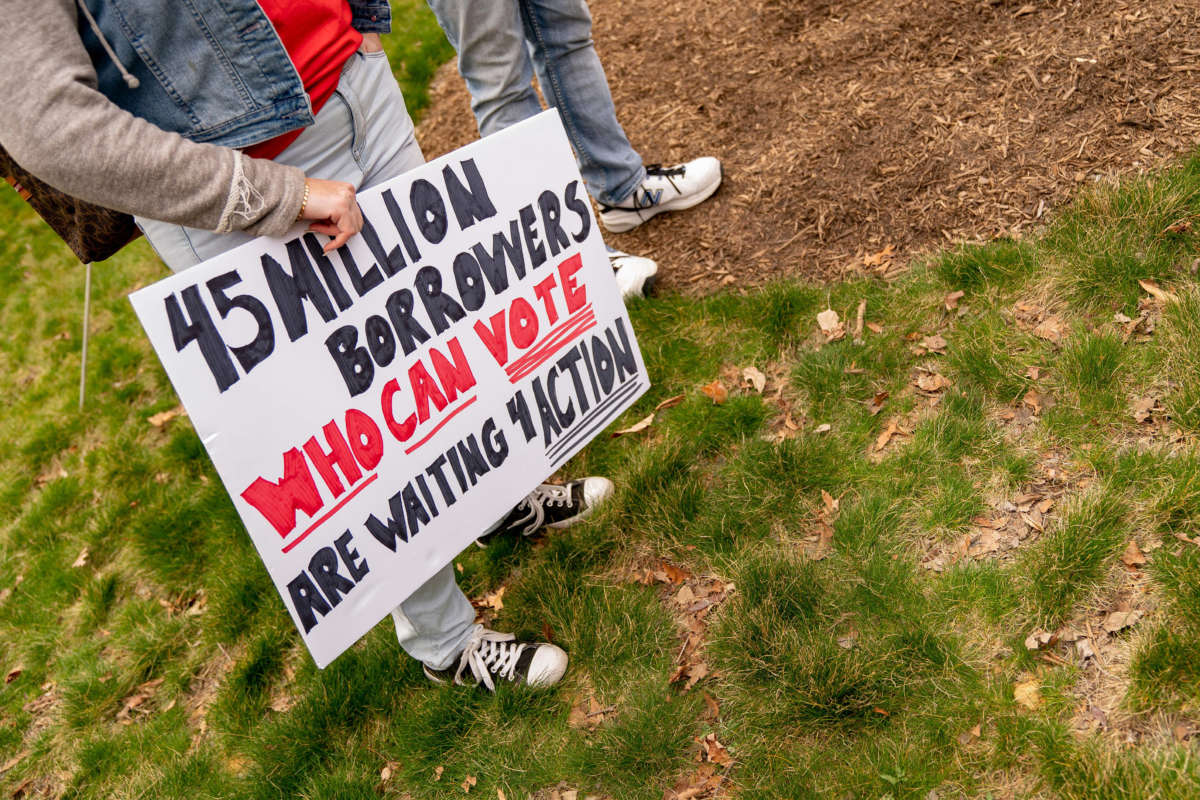If President Joe Biden doesn’t follow up on his pledge to provide much-needed relief to the 45 million Americans who hold student debt, activists will hold a debt strike, the Debt Collective announced on Thursday.
The current student loan pause expires in less than two weeks, on August 31. The Biden administration’s decision on whether or not to extend the pause could sway the results of the upcoming midterm elections in November.
Debt activists, frustrated with Biden for waffling on the pause and for failing thus far to follow up on his campaign promise to cancel up to $10,000 of debt per borrower, say that they’ll begin striking in September if he doesn’t extend the pause. The strike will consist of 50 student debtors over the age of 50 to “highlight the destructive impact of student debt on older Americans,” the Debt Collective said in a press release.
Together, the 50 strikers hold $6 million in debt, or an average of about $113,700 per person. Several of the strikers hold over $300,000 in debt — close to the average price of a home pre-COVID. Forty of the 50 strikers are women.
Many older debtors describe their student loans as oppressive burdens that have loomed over them for the better part of their lives. Though older borrowers are often overlooked in conversations about student debt, they are the fastest growing demographic of student debtors.
“I’m going on strike because I simply cannot pay off my student loans,” Dawn Wills, a Black woman from New York who will participate in the strike, said in a statement. “I have been paying for over 20 years and the interest just keeps adding up and the amount has ballooned from $50,000 to over $100,000.”
“I tried several times to get relief by working in nonprofit organizations to get the public service cancellations but was unsuccessful,” she went on. “I feel that I am in a trap with no escape.”
“I have worked constantly, sometimes three jobs at a time, even to this day at age 50,” said another debt striker. “But my undergraduate debt from 1994 is still $96,000. I’ve called my loan servicer several times to ask why my nearly $600/month payment was going entirely to interest and never to the principal. I was told ‘that’s just the way your loan is structured.’ I have paid over $50,000, which is more than I owed when I graduated.”
The strike will be part of a larger effort by the Debt Collective to encourage as many borrowers as possible to refrain from student loan payments. This doesn’t mean defaulting on payments, the group says, which has long term, harmful consequences for student debtors.
Instead, the group defines a debt strike as having borrowers take every step they can to reduce their regular payments to $0, whether through public service student loan forgiveness, applying for waivers for people who have debt from predatory for-profit schools, or other methods.
Previous debt strikes and mobilizations led by the Debt Collective have succeeded in canceling billions of dollars in debt, the activists say.
This week, the Biden administration canceled $3.9 billion in debt for 208,000 borrowers who attended ITT Technical Institute, the now-defunct for-profit school that the Education Department said “intentionally misled students about the quality of their programs” in order to glean a profit from federal student loan programs.
Earlier this summer, the administration canceled $5.8 billion in loans for 560,000 borrowers who attended Corinthian Colleges, another for-profit school that officials found lied to and defrauded borrowers. Both of these cancellations were the result of years of work from debt activists to strike and bring attention to the loans.
The Biden administration has hinted that it may extend the pause again. But with such little time before the pause is set to end, borrowers are living in fear of the possibility that they may soon have to restart payments. A survey from earlier this year found that the vast majority of borrowers say they’re not prepared for payments to start, a problem that has likely been exacerbated over the months as inflation soars.
Join us in defending the truth before it’s too late
The future of independent journalism is uncertain, and the consequences of losing it are too grave to ignore. To ensure Truthout remains safe, strong, and free, we need to raise $47,000 in the next 8 days. Every dollar raised goes directly toward the costs of producing news you can trust.
Please give what you can — because by supporting us with a tax-deductible donation, you’re not just preserving a source of news, you’re helping to safeguard what’s left of our democracy.
